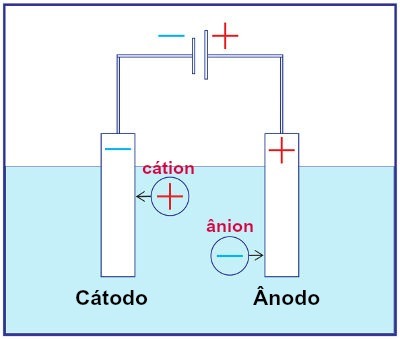The term metabolism (from the greek metabolic, which means change) is used to describe the various chemical reactions existing in the body that guarantee the structural needs and energetics of a living being. Among the purposes of these chemical reactions, we can mention the synthesis and breakdown of biomolecules, a production of energy and the conversion of nutrient molecules into macromolecule precursor units.
O metabolism it is not unique to human beings and occurs in all living beings, whether unicellular or multicellular. The reactions that make up metabolism can be classified into two major metabolic processes: anabolism and catabolism.
→ Difference between anabolism and catabolism
we call anabolism or constructive metabolism chemical reactions related to biomolecule synthesis, that is, simple and small precursor molecules used in the production of new substances needed by the organism, both for its growth and for its maintenance. these reactions only occur when a cell has enough energy. They are responsible, for example, for forming the macromolecules that make up the cell.
O catabolism or oxidative metabolism, in turn, are all chemical reactions of a degrading character, that is, those reactions aimed at breaking or unfolding molecules. In these processes, there is the release of energy necessary to carry out various activities. It is in catabolism that carbohydrates, lipids and proteins, for example, are broken down into smaller, simpler products.
Catabolism can be further classified into aerobic catabolic metabolism and anaerobic. Aerobic catabolic metabolism is one in which reactions occur in the presence of oxygen, which works as a final electron acceptor in the respiratory chain, it combines with hydrogen and forms water (Learn more in: Cellular respiration). In anaerobic catabolic metabolism, reactions occur in the absence of oxygen.
Even though they are opposite reactions, anabolism and catabolism provide a perfect balance in our body and, therefore, they are interconnected. While catabolism guarantees the release of energy, anabolism uses it to synthesize biomolecules.
→ Basal metabolic rate
We call it basal metabolic rate the minimum energy needed for the body to be able to carry out its basic activities at rest, how to make the heart work and ensure breathing. This rate varies from one person to another, since energy expenditure depends, among other factors, on the individual's age, sex and level of activity.
By Ma. Vanessa dos Santos
Source: Brazil School - https://brasilescola.uol.com.br/o-que-e/biologia/o-que-e-metabolismo.htm


